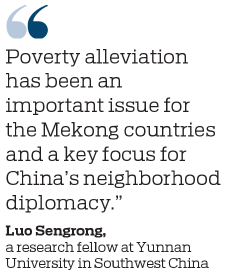Mekong area looks to neighbor as it fights poverty

The charity group We Love Yangon, established during the COVID-19 outbreak to eradicate poverty in rural areas across the Lancang-Mekong River basin, has its hands full. Fortunately, it has received a helping hand from its Chinese partners.
The support from China "is very important for Myanmar", said Zaw Win Khaing, the founder and general secretary of the community-based philanthropic association. Amid the pandemic, the group has distributed food to more than 30,000 poor households in the Yangon region of Myanmar.
The Mekong River, known in China as the Lancang River, is a vital waterway for China, Laos, Myanmar, Thailand, Cambodia and Vietnam.
"Poverty alleviation has been an important issue for the Mekong (river basin) countries and a key focus for China's neighborhood diplomacy," said Luo Shengrong, a research fellow at Yunnan University's Institute of International Relations and Center for China's Neighborhood Diplomacy.
"With joint efforts from different departments, the goal of poverty alleviation under the Lancang-Mekong Cooperation framework has become more pertinent," Luo said.
Poverty alleviation has been among the key cooperation areas under the framework, which was launched in March 2016.
Noting that the Mekong River basin is home to a large rural population, he said, "Rural development is key to the cooperation in poverty alleviation among Mekong countries."
In December, President Xi Jinping announced that all rural people on the Chinese mainland, based on the country's current criteria, had been lifted out of absolute poverty.
"Since the reform and opening-up, China has always put the focus of poverty alleviation on the rural areas, and has developed a path of poverty alleviation in line with the country's situation," said Luo.
China's poverty-alleviation projects can be a good example for Mekong River basin countries such as Thailand, said Kanokwan Manorom, director of the Mekong Sub-Region Social Research Center at Ubon Ratchathani University in Thailand.
Despite the difference in governing systems and cultural background, Manorom said, "Thailand can apply precise poverty reduction in some ways", such as conducting a comprehensive survey to screen and cover all the poor people in specific areas.
"Learning how each country eliminates poverty in the Greater Mekong Subregion also helps each government," said Manorom, adding that this will help to achieve their common goal of poverty reduction.
Bernard Kervyn, regional director of the nonprofit organization Mekong Plus in Vietnam and Cambodia, said he "would be very happy" to work with Chinese organizations to jointly promote poverty alleviation in the Mekong River basin countries.
For example, Kervyn said, cooperation between these countries can help millions of children in rural areas who have failed to receive proper education for almost a year, as schools are closed due to the COVID-19 pandemic.
"It would be a very good step towards peace," said Kervyn, adding that cooperation in poverty alleviation between China and Mekong River basin countries could help people better understand and work with each other.
Zaw from We Love Yangon said," The pandemic has no borders, and that's why we have to cooperate with each other," citing as an example the association's cooperation with China.
In May, We Love Yangon and the China Foundation for Poverty Alleviation's Myanmar office jointly kicked off the Smile Children Program, a food-distribution project that helps schoolchildren and their families. Donations worth $40,000 were received from the Chinese foundation, according to Zaw.
The support is important to the local families, since many of them were forced to live with less or even no income due to the pandemic, Zaw said.
Zaw said he hopes in the future to launch scholarship programs to allow outstanding students in Myanmar to study in Chinese universities. "China has a lot of experience (in poverty alleviation). We want to cooperate."
Luo, from Yunnan University, said the China-proposed Belt and Road Initiative can also provide a model for restructuring regional cooperation and management of the recovery, as the pandemic has made poverty worse for many people. "Win-win cooperation is already a huge contribution to the global effort of poverty eradication," he said.
Besides economic benefits, the initiative also helps provide more international talent for countries that participate in the BRI, which will in turn be an impetus for the development of poverty-stricken areas, Luo said.
"The experience in poverty alleviation from China and the Mekong countries will provide valuable lessons for developing countries around the world," he added.
kelly@chinadaily.com.cn






















